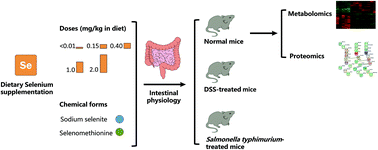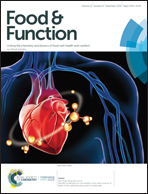Varied doses and chemical forms of selenium supplementation differentially affect mouse intestinal physiology†
Abstract
In this study, the effects of three doses (diets containing <0.01, 0.15, 0.40 mg kg−1 Se) and two forms (sodium selenite and selenomethionine) of dietary Se supplementation on the intestinal physiology of untreated, dextran sodium sulfate-treated, and Salmonella typhimurium-infected mice were evaluated. The underlying modes of action of the varied doses and forms of Se supplementation were analyzed using fecal metabolomic and jejunal proteomic approaches. Compared with adequate Se (0.15 mg kg−1 Se) supplementation, Se-deficiency supplementation adversely affected the gut barrier and intestinal immune responses of the untreated mice and increased their susceptibility to experimental colitis and pathogen infection. In contrast, supranutritional Se (0.40 mg kg−1 Se) supplementation improved mouse intestinal physiology compared with adequate Se supplementation. Varied doses of Se supplementation differentially perturbed the fecal metabolic profiles of and jejunal protein expression in mice. Further, both forms of dietary Se supplementation, i.e., sodium selenite and selenomethionine, showed similar effects on the gut barrier and intestinal immune homeostasis but differentially affected fecal metabolites, such as neurosubstances and immunomodulators, and induced significant proteomic variations in various pathways, including the xenobiotic detoxification pathway and glutathione metabolism. Our results indicate that the doses and chemical forms of Se should be considered when developing dietary nutritional supplements for gut health.



 Please wait while we load your content...
Please wait while we load your content...